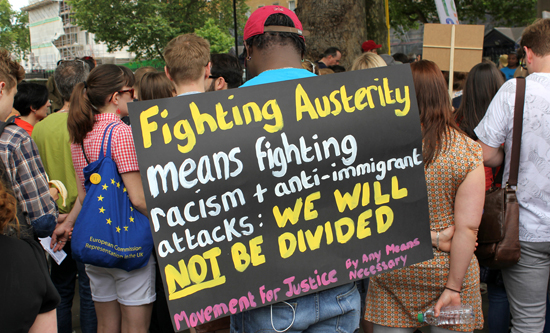As an initial reaction to the police killings of black people in the US, but also in response to state racism and violence in Britain, a wave of anti-racist protest took place across Britain in July. Most of the demonstrations were led by working class black people, who brought city centres to a standstill and protested outside police stations, law courts and the offices of the so-called Independent Police Complaints Commission. When 18-year-old Mzee Mohammed died in police custody in Liverpool on 14 July, this movement was ready to respond, and on 16 July more than a thousand people took to the streets of Liverpool. In Manchester, a longstanding black activist told FRFI, following a Black Lives Matter march in the city: ‘The last time I saw Moss Side like this was 1981’ – a time of widespread radical politics and uprisings led by black sections of the working class. Tom Vickers reports.
Racism in the wake of the Brexit vote
A movement against racism is more than needed in ‘post-Brexit’ Britain. The campaign to leave the EU was fought on the openly racist basis that leaving would make it easier to restrict immigration, culminating in UKIP leader Nigel Farage unveiling a billboard showing a long line of mostly ethnic minority people with the words ‘Breaking Point: the EU has failed us all’. Given the racism of the Leave campaign, its victory boosted the confidence of racists. Police reported a 42% increase in hate crimes in England and Wales for the two weeks surrounding the vote, compared to the same period last year. There have been many reports of incidents where racist abuse specifically referred to the vote, and this increase in racism has been directed both at EU migrants and ethnic minorities more broadly.
The Remain campaign and large sections of the capitalist media were quick to label the vote to leave the EU as the result of working class racism, but this ignored the role the vote played in giving expression to anger at the consequences of years of austerity, in the form of decimated services, falling wages and growing poverty. The concentration of migrants in areas with poor housing and services can appear, in the everyday experience of many people living in these areas, as though it is the migrants themselves who are the cause of these problems. In the absence of a significant anti-racist movement, it is little surprise that it proved easy to direct many people’s anger and frustration towards migrants, or at least to secure their consent to vote Leave, despite the campaign’s explicit racism.
The national chauvinism of the Remain campaign made it impossible for it to seriously challenge the racism of the Leave campaign – typical was the leaflet produced by the Labour Party that harked back to the rhetoric of the British Empire, headed by a Union Jack and the slogan ‘Britain is More Powerful in Europe’ and the call to ‘Vote for Britain’s Place as a World Power’.
Fighting post-referendum racism
Following the referendum, there has been a surge of activity around certain forms of anti-racism, led by organisations such as the People’s Assembly and Stand Up to Racism, but this has taken place almost entirely in isolation from the mobilisations led by black sections of the working class. The opportunists of the middle class left and sections of the capitalist media are quick to talk about racism when it is perpetrated by individuals or small far-right groups following the Brexit vote, but when it comes to the racism of the British state they have been silent even as mobilisations by working class black people have grown.
Not only that, but these organisations are currently so preoccupied with their campaign to defend Jeremy Corbyn that every protest they hold against racism and austerity is being turned into a rally for Corbyn. At the same time, Corbyn’s supporters are all but absent from the mass mobilisations of black people against state racism. So, for example, of the thousand people who came out to support Corbyn in Liverpool on 2 July, only a handful were present a few weeks later to support the demonstration called by the family of Mzee Mohammed.
Refugees resist
Outside Britain, refugees and migrants from oppressed countries continue to struggle against the violence of Fortress Europe, of which Britain has been a leading architect. By the day of the EU referendum, 3,050 people had been reported dead or missing at Europe’s borders since the start of the year. The vast majority of these deaths could have been avoided if there were legal routes for people to travel. In July EU officials completed proposals for a new EU asylum system that will further reduce rights and make it easier to deport people to countries previously defined as unsafe. A promise last year to resettle 22,504 refugees directly from countries in the Middle East – a tiny number relative to the number of refugees in the region and the EU’s population – has largely failed to be implemented, with only 8,268 resettled by July. Last year Theresa May proposed creating camps in so-called ‘transit countries’ to detain people suspected of being on their way to Europe. In or out of the EU, we can expect Britain’s role in Fortress Europe to continue.
Build a movement!
There is enormous potential for building anti-racist alliances: black people facing police violence and harassment, migrants and refugees subject to detention, deportation and restricted access to work and welfare, Muslims targeted by terror laws, and Eastern European migrants who already have limited rights and now face an uncertain future post-Brexit, all have a common enemy in the British state and a common interest in uniting in struggle. The wider working class experiencing precarious working conditions, poverty wages and austerity faces the same enemy and needs to understand that it also has an interest in fighting racism. A new movement can and must be built.
Fight Racism! Fight Imperialism! 252 August/September 2016




